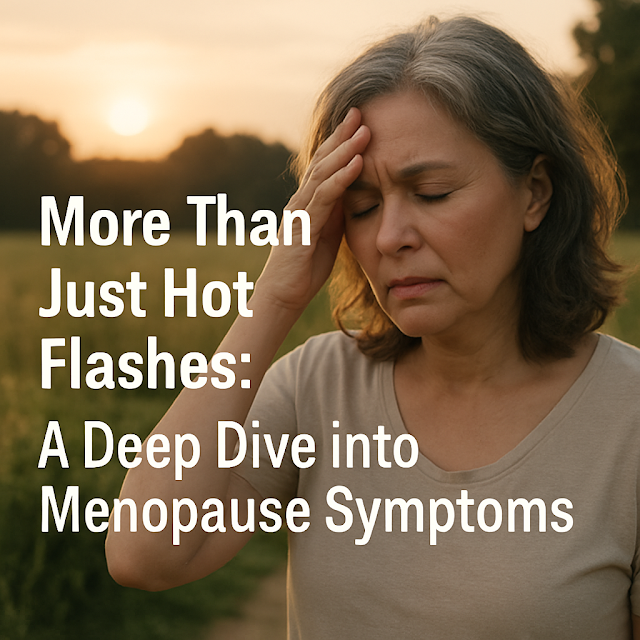When most people think of menopause, one word typically comes to mind: hot flashes. While hot flashes are indeed one of the hallmark symptoms, menopause is far more complex, affecting nearly every system in a woman’s body. From emotional upheaval to physical changes, the transition into menopause is unique for every woman, and it’s time we expanded the conversation beyond just one symptom.
This article explores the broad spectrum of menopause symptoms, their causes, and how women can better understand and manage this transformative stage of life.
What Is Menopause?
Menopause marks the end of a woman’s reproductive years, officially defined as the point when a woman has gone 12 consecutive months without a menstrual period. It typically occurs between the ages of 45 and 55, but the years leading up to it—called perimenopause—can begin as early as the mid-30s and last for several years.
During this time, the ovaries gradually produce less estrogen and progesterone, two hormones essential for regulating the menstrual cycle and supporting various bodily functions. These hormonal shifts cause the many physical, emotional, and cognitive symptoms women experience.
The Most Recognized Symptom: Hot Flashes
Let’s start with the familiar.
🔥 Hot Flashes and Night Sweats
Hot flashes are sudden waves of heat that rush through the body, often accompanied by sweating, a red face, and a racing heart. They can last from 30 seconds to several minutes and may occur multiple times a day, or even at night, known as night sweats, which often disrupt sleep.
But while hot flashes are the most visible symptom, they are just one part of the menopause experience.
Lesser-Known Menopause Symptoms: A Full-Body Shift
🧠 1. Brain Fog and Memory Lapses
Many women notice they’re more forgetful or find it harder to concentrate. This “brain fog” is real and often linked to estrogen’s role in cognitive function. You may lose your train of thought mid-sentence or forget names more frequently—common, but distressing, effects of hormonal changes.
😔 2. Mood Swings, Anxiety, and Depression
Mood changes are another hallmark of menopause. Hormonal fluctuations can disrupt neurotransmitters like serotonin and dopamine, leading to:
Women with a prior history of mood disorders or PMS may be susceptible to these changes.
😴 3. Sleep Disturbances
Insomnia becomes more common during menopause, sometimes due to night sweats but also from a direct hormonal effect on sleep-regulating systems in the brain. Some women struggle to fall asleep, while others wake up multiple times a night or feel unrefreshed in the morning.
💔 4. Heart Palpitations and Chest Discomfort
Estrogen has protective effects on the cardiovascular system. As levels drop, some women experience palpitations or notice their heart “skipping a beat.” Though often benign, any new heart symptoms should be checked to rule out underlying issues.
🦴 5. Joint and Muscle Pain
Estrogen helps reduce inflammation and maintain joint and muscle function. Its decline can lead to:
🩸 6. Irregular Periods and Heavy Bleeding
Before periods stop completely, they often become erratic. Some months might pass without a period, only to be followed by a heavier or prolonged one. These changes are driven by inconsistent ovulation and hormonal imbalance.
🍃 7. Vaginal Dryness and Painful Intercourse
As estrogen declines, the tissues of the vagina become thinner, drier, and less elastic. This can lead to:
-
Discomfort or pain during sex (dyspareunia)
-
Increased risk of vaginal infections
-
Burning, itching, or irritation
These symptoms, though common, are often left unspoken due to stigma, but they are treatable.
🚽 8. Urinary Problems
The bladder and urethra are also sensitive to estrogen levels. As they weaken, women may notice:
-
Increased urgency or frequency of urination
-
Incontinence or leaks
-
Higher risk of urinary tract infections (UTIs)
⚖️ 9. Weight Gain and Metabolism Changes
During and after menopause, many women find it harder to maintain their weight, especially around the abdomen. This is due to:
💇 10. Hair and Skin Changes
Thinning hair, brittle nails, and dry or sagging skin are common. These cosmetic changes may seem minor, but can have a big emotional impact.
Why the Range of Symptoms Is So Wide
Menopause affects every woman differently. Genetics, lifestyle, pre-existing health conditions, and even cultural background can shape how symptoms appear and how intense they are.
Some women breeze through menopause with minimal discomfort, while others struggle with multiple disruptive symptoms for years. That’s why it’s critical to treat menopause as a personalized health journey, not a one-size-fits-all experience.
Coping With Menopause: Treatment Options and Lifestyle Support
💊 Medical Treatments
-
Hormone Replacement Therapy (HRT): Helps relieve many symptoms by replacing lost estrogen and progesterone.
-
Non-hormonal medications: SSRIs or SNRIs can help with mood, hot flashes, and sleep.
-
Vaginal estrogen: Comes in creams, rings, or tablets to address dryness and pain during sex.
🧘♀️ Lifestyle Approaches
-
Balanced Diet: Whole grains, healthy fats, and calcium-rich foods support hormonal and bone health.
-
Regular Exercise: Boosts mood, supports heart health, and helps manage weight.
-
Mind-Body Practices: Yoga, meditation, and deep breathing can reduce stress and improve sleep.
-
Quit Smoking & Limit Alcohol: Both habits can worsen symptoms and increase health risks during menopause.
Menopause Myths to Bust
❌ "It only lasts a year."
Perimenopause can last 4–10 years, and symptoms can persist even post-menopause.
❌ "All women get hot flashes."
Not true—some women never experience hot flashes but still suffer other intense symptoms.
❌ "There's nothing you can do about it."
Modern medicine, holistic practices, and community support offer many ways to manage menopause effectively.
Conclusion: Menopause Deserves More Conversation
Menopause is more than just hot flashes—it's a full-body, whole-life transformation. Understanding the diverse range of symptoms can empower women to seek the help they need and reduce the stigma surrounding this natural phase of life.
By recognizing the signs, advocating for your health, and embracing supportive resources, you can move through menopause with clarity, strength, and confidence. It’s not just an end—it’s the beginning of a new chapter.









0 Comments